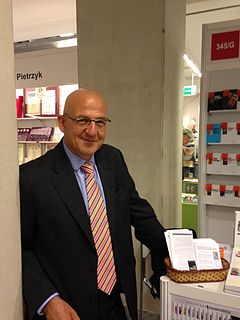Neuro-linguistic programming (NLP) is a pseudoscientific approach to communication, personal development, and psychotherapy created by Richard Bandler and John Grinder in California, United States, in the 1970s. NLP's creators claim there is a connection between neurological processes (neuro-), language (linguistic) and behavioral patterns learned through experience (programming), and that these can be changed to achieve specific goals in life. Bandler and Grinder also claim that NLP methodology can "model" the skills of exceptional people, allowing anyone to acquire those skills. They claim as well that, often in a single session, NLP can treat problems such as phobias, depression, tic disorders, psychosomatic illnesses, near-sightedness, allergy, the common cold, and learning disorders. NLP has been adopted by some hypnotherapists and also by companies that run seminars marketed as leadership training to businesses and government agencies.

Virginia Satir was an American author and psychotherapist, recognized for her approach to family therapy. Her pioneering work in the field of family reconstruction therapy honored her with the title "Mother of Family Therapy". Her most well-known books are Conjoint Family Therapy, 1964, Peoplemaking, 1972, and The New Peoplemaking, 1988.
John Thomas Grinder Jr. is an American linguist, author, management consultant, trainer and speaker. Grinder is credited with co-creating neuro-linguistic programming (NLP) with Richard Bandler. He is co-director of Quantum Leap Inc., a management consulting firm founded by his partner Carmen Bostic St. Clair in 1987. Grinder and Bostic St. Clair also run workshops and seminars on NLP internationally.

Richard Wayne Bandler is an American consultant in the field of self-help. With John Grinder, he founded the neuro-linguistic programming (NLP) approach to psychotherapy in the 1970s.

Counseling psychology is a psychological specialty that encompasses research and applied work in several broad domains: counseling process and outcome; supervision and training; career development and counseling; and prevention and health.
Body psychotherapy, also called body-oriented psychotherapy, is an approach to psychotherapy which applies basic principles of somatic psychology. It originated in the work of Pierre Janet, Sigmund Freud and particularly Wilhelm Reich who developed it as vegetotherapy. Branches also were developed by Alexander Lowen and John Pierrakos, both patients and students of Reich, like Reichian body-oriented psychotherapy.

Charles Faulkner is an American who is a practitioner of neuro-linguistic programming (NLP), life coach, motivational speaker, trader and author.
Representational systems (also known as sensory modalities and abbreviated to VAKOG is a postulated model from neuro-linguistic programming a pseudoscientific collection of models and methods regarding how the human mind processes and stores information. The central idea of this model is that experience is represented in the mind in sensorial terms, i.e. in terms of the putative five senses, qualia.
Steve Andreas was an American psychotherapist and author specializing in Neuro-linguistic programming.
The United Kingdom Council for Psychotherapy (UKCP) is a professional association of psychotherapy organisations and practitioners in the United Kingdom. It is restricted to registered clinical psychotherapists and psychotherapeutic counsellors.
Covert hypnosis is an attempt to communicate with another person's unconscious mind without informing the subject that they will be hypnotized. It is also known as conversational hypnosis or sleight of mouth. It is a term largely used by proponents of neuro-linguistic programming (NLP), a pseudoscientific approach to communication and interaction.
The British Association for Counselling and Psychotherapy (BACP) is a professional body for counsellors and psychotherapists practising in the United Kingdom.
Jeffrey K. Zeig, is a writer, teacher and practitioner of psychotherapy. He has edited, co-edited, authored or coauthored more than 20 books on psychotherapy that appear in fourteen languages. He organises several conferences on psychotherapy, and is the founder and director of the Milton H. Erickson Foundation.
The methods of neuro-linguistic programming are the specific techniques used to perform and teach neuro-linguistic programming, which teaches that people are only able to directly perceive a small part of the world using their conscious awareness, and that this view of the world is filtered by experience, beliefs, values, assumptions, and biological sensory systems. NLP argues that people act and feel based on their perception of the world and how they feel about that world they subjectively experience.
Connirae Andreas is an American author and psychotherapist who is known for her work within the field of Neuro-linguistic programming (NLP).

Fazal Inayat-Khan, also known as Frank Kevlin, was a psychotherapist and poet who led the Inayati Order from 1968 to 1982.
The British Psychoanalytic Council (BPC) is an association of training institutions and professional associations which have their roots in established psychoanalysis and analytical psychology. They bring together approximately 1500 practitioners of psychoanalytic and psychodynamic psychotherapy who as individuals become registrants of the BPC.
Dragomir R. Radev is a Yale University professor of computer science working on natural language processing and information retrieval. He previously served as a University of Michigan computer science professor and Columbia University computer science adjunct professor. Radev serves as Member of the Advisory Board of Lawyaw.

Tomasz Witkowski is a Polish psychologist, skeptic and science writer. He is known for his unconventional campaigns against pseudoscience. He specializes in debunking pseudoscience, particularly in the fields of psychology, psychotherapy, and diagnostics. Witkowski also engages in debates on pseudoscience-related topics, emphasizing scientific skepticism.